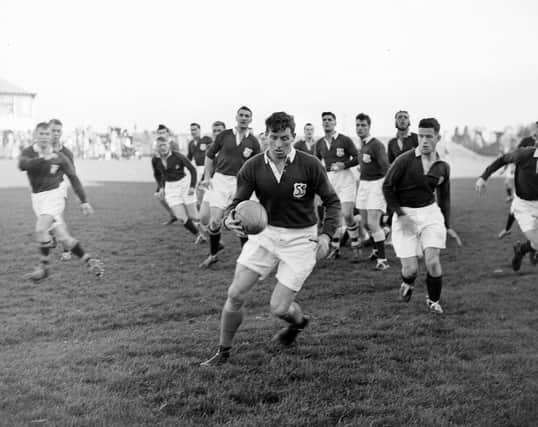Obituary: Christy Elliot, Langholm legend and former Scotland rugby internationalist


Christy Elliot, rugby player. Born: 24 February, 1933 in Langholm. Died: 5 September, 2020, in Carlisle, aged 87
CHRISTY ELLIOT, who has died, aged 87, was a veritable legend in Langholm, and a well-known and much-loved figure across Scottish rugby.
Advertisement
Hide AdAdvertisement
Hide AdHe gave an incredible quarter century of playing service to his beloved Langholm Rugby Club, making his debut as a 15-year-old schoolboy, and playing on into the club’s centenary season in 1972. Although he won his international caps as a winger, for his club, he mainly played as a centre, with the occasional outing as a stand-off. He scord more than 2,000 points for the club during his long service.
Langholm’s annus mirabilis in season 1958-59 – when they won the Border League, the Unofficial Scottish Championship and, perhaps most-importantly to the Milntown faithful, their own Sevens – was a terrific season for Elliot, who top scored for the club with 252 points.
Nine of these came in the most epic match, a midweek trip to Melrose in April. It seemed as if half the Muckle Toon had made the trip to the Greenyards, to see Elliot kick three penalties in a tense game, to out-score two Melrose tries in a 9-6 win. The two titles, Border League and Unofficial Championship were theirs and it is estimated more than 1,500 townsfolk were on the streets of Langholm to welcome home Elliot and the other heroes.
He was already a South player, and the previous season, he had won the first of an eventual 12 full caps, in the final Five Nations match of 1958 – the Calcutta Cup clash with England at Twickenham; when he was a late call-up to replace Scotland captain Arthur Smith, who had gone down with flu. In a somewhat dour encounter, the debutant finally gave the Scots in the crowd something to cheer when, early in the second half, he broke the deadlock with a penalty goal. He also came closer to a try than anyone else. It took a courageous tackle from Dickie Jeeps – who had to leave the field as a result of the injury he sustained – to keep Elliot out. However, near the end, England’s George Hastings kicked an equalising penalty to make the final score 3-3.
He retained his place in the team, although switching from right wing to left, for the opening game of the 1959 season, a loss to France in Paris, but dropped out of the team until recalled for France’s visit to Murrayfield in1960.
He then dropped out of the team again and spent three years in the wilderness, before being recalled for the 1963 Calcutta Cup match, at Twickenham.
Elliot held on to his place in the side throughout the 1963-64 season, playing his part in the titanic 0-0 draw with the 1964 All Blacks – a result which denied them a Grand Slam. He also, on the occasion of his tenth cap, against France at Murrayfield, notched-up his first win in a Scotland jersey. He also, that season, helped Scotland beat England for the first time in14 years and take a share of the Five Nations Championship, their first since 1938. At the end of that season, he went to Canada with the Scottish touring party.
He played in the first three matches of the 1965 Five Nations, but was dropped following a disappointing loss to Ireland. His Scotland career was over.
Advertisement
Hide AdAdvertisement
Hide AdThat same season, he captained a Scottish Districts XV to a 16-8 win over the touring South Africans, kicking a penalty goal and two conversions in the match at Hawick’s Mansfield Park. It was on the Hawick ground too that he played his final game for Langholm, signing-off with a try, which was even applauded by the Hawick faithful.
As befits a true Borderer, his National Service was served with the KOSB, and included service during the Korean War. He returned to Langholm, to work for the well-known wollen and tweed manufacturers Arthur Bell (Scotch Tweeds), where he was the manager.
Elliot was a burly figure, never one of the “greyhound” wingers, but, he was very difficult to stop when he had built up a head of steam. He was also remarkably good at warding off would-be tacklers with his famous “hip swerve.” He was also a ferocious textbook tackler and he enjoyed seven victories with Langholm on the Borders Sevens circuit.
He was a Barbarian, a Co-optimist and a member of Scottish Rugby’s capped brothers group – younger sibling Tom, a flanker, won five caps between 1968 and 1970.
After hanging-up his boots, he continued to be a significant figure around the club. He played no small part in mentoring and encouraging Billy Steele and Stephen Turk, two later Langholm wingers who would follow him into the Scotland team, while he was unwavering in his support for Langhlm, attending games at Milntown until almost the end of his long life.
Christy Elliot is survived by his wife Mary, their daughter Laura, son David and five grandchildren.
Comments
Want to join the conversation? Please or to comment on this article.